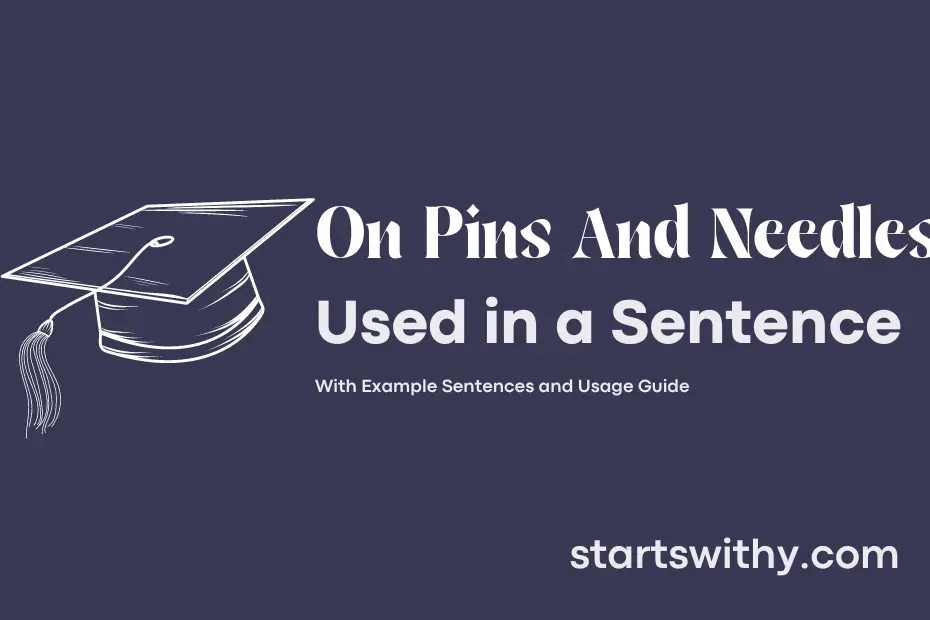Are you familiar with the term “on pins and needles”? This common expression is used to describe a state of anxious anticipation or nervousness.
When someone is “on pins and needles,” they are usually feeling tense, excited, or anxious about something that is about to happen. This phrase paints a vivid picture of someone eagerly awaiting an outcome, constantly shifting and fidgeting, as if they were sitting on sharp needles or pins.
7 Examples Of On Pins And Needles Used In a Sentence For Kids
- The little mouse was on pins and needles waiting for the cheese.
- The children were on pins and needles waiting for their turn to play.
- The students were on pins and needles waiting for the story to start.
- The puppy was on pins and needles waiting for a treat.
- The baby bird was on pins and needles waiting for its mother to come back.
- The kitten was on pins and needles watching the toy move.
- The butterfly was on pins and needles waiting to fly away.
14 Sentences with On Pins And Needles Examples
- On pins and needles waiting for the exam results to be announced.
- On pins and needles during the last few minutes of submission for a major assignment.
- On pins and needles while waiting in line to pay fees for the semester.
- On pins and needles as the professor reads out the names of students called for presentations.
- On pins and needles while checking the university website for any updates on class schedules.
- On pins and needles trying to find a seat in a crowded cafeteria during lunch hour.
- On pins and needles waiting for the library to open to borrow a crucial textbook.
- On pins and needles during a group project presentation in front of the entire class.
- On pins and needles trying to connect to the internet for online lectures right before an important session.
- On pins and needles hoping for a quick response from the administration regarding hostel accommodation.
- On pins and needles during a surprise quiz given by the professor without any prior notice.
- On pins and needles when the college notice board is updated with the list of eligible candidates for campus placements.
- On pins and needles when the printer runs out of ink minutes before a submission deadline.
- On pins and needles waiting for the bus to arrive to take you to an important seminar on campus.
How To Use On Pins And Needles in Sentences?
To use On Pins And Needles in a sentence, think of a situation where someone is feeling very anxious or nervous about something. For example, “I have a job interview tomorrow, and I am on pins and needles waiting to hear back from them.”
When using this phrase, make sure to emphasize the feeling of tension, nervousness, or anticipation in the situation. You can also replace On Pins And Needles with synonyms like “anxiously waiting” or “on edge” to convey a similar meaning in your sentence.
Remember that On Pins And Needles is an idiom, which means it is not meant to be taken literally. It is used to describe a state of extreme uneasiness or suspense in a more vivid and expressive way.
Practice incorporating On Pins And Needles into your conversations or writing to become more familiar with using this idiom correctly. Just remember to use it in situations where someone is feeling on edge or eagerly anticipating something.
In summary, using On Pins And Needles effectively in a sentence involves conveying a sense of nervous anticipation or anxiety about a particular situation. Keep practicing to become more comfortable incorporating this idiom into your everyday language.
Conclusion
In conclusion, the phrase “on pins and needles” is used to describe a state of nervousness, anxiety, or anticipation. This expression vividly conveys the feeling of being on edge or feeling tense about something that is about to happen. Examples like “She was on pins and needles waiting for the test results” or “The audience was on pins and needles during the final moments of the play” illustrate how this phrase can effectively convey a sense of heightened anticipation or suspense.
By using the phrase “on pins and needles,” individuals can easily relate to the sensation of feeling nervous or anxious, making it a powerful way to communicate emotions and experiences. Whether waiting for news, anticipating an outcome, or experiencing a tense situation, this phrase captures the uneasiness and suspense that often accompanies such moments, making it a commonly used expression in everyday language.



